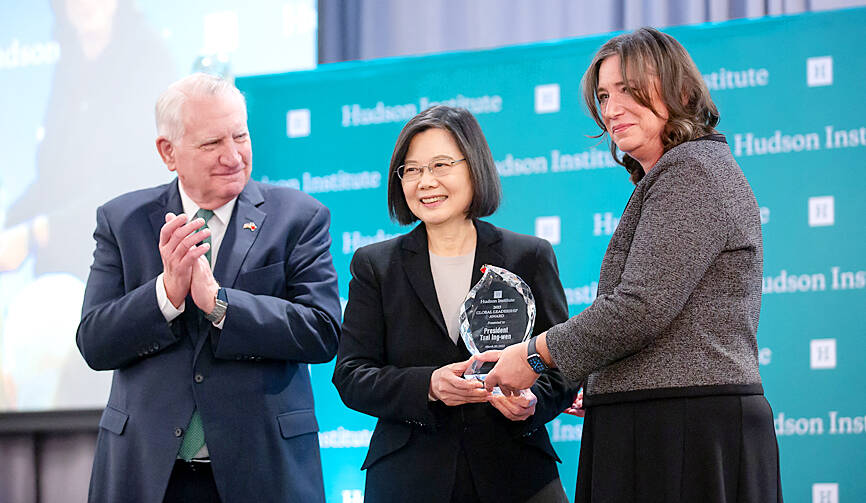President Tsai Ing-wen (蔡英文) on Thursday received the Hudson Institute’s Global Leadership Award for her work to deepen the nation’s ties with the US and her determination to maintain a free and open Indo-Pacific region.
Hudson Institute Board of Trustees chair Sarah May Stern along with president and CEO John Walters presented the award to Tsai on Thursday night during her stopover in New York before departing to visit Guatemala and Belize, two of Taiwan’s diplomatic allies.
The award “is presented to exceptional individuals who have demonstrated extraordinary leadership in service of the principles at the core of Hudson’s mission of promoting security, freedom and prosperity,” the institute’s Web site said.

Photo: Reuters
Tsai “has led a vibrant democracy with great courage and clear-eyed determination to resist tyranny and maintain a free and open Indo-Pacific,” Walters said.
Under her leadership, the US and Taiwan have expanded and deepened their security and economic relationship, he said, adding that “we are proud that America stands with Taiwan.”
Tsai is “a frontline defender of democracy” by the US and many countries around the world, Walters said, adding that Americans can learn an important lesson from her and the people of Taiwan.
Tsai said the award is “a tribute to the people of Taiwan,” as their courage and perseverance ended the Martial Law era and transformed Taiwan into a democratic nation that continues to pursue peace and prosperity with like-minded partners.
Taiwan always responds to escalations of tensions provoked by China with prudence and calmness, demonstrating to the world that Taiwan acts responsibly, Tsai said.
Taiwanese hope for peace, but history shows that the best way to avoid war is to be stronger than adversaries, she said.
Taiwan has grown closer to democratic countries around the world, but is still excluded from the UN and other international organizations, an injustice that must end, she said.
Safeguarding peace and stability across the Taiwan Strait is crucial, as cross-strait instability brings economic and security risks to the world, Tsai said, adding that the world should forge deeper security cooperation and robust economic partnerships with Taiwan.
Taiwan is not only “resilient and deeply believes in the power of democracy,” but also “determined to protect our way of life,” she said.
The US and Taiwan “have much in common when it comes to individual rights, liberty and democracy,” Washington-based Heritage Foundation founder Edwin Feulner said.
Regarding people who protested outside the ceremony venue, Feulner said that “it is unfortunate that a friend of democracy, a friend of the American people, received such a welcome and confrontation in the US.”
Asked whether Tsai would speak with former US secretary of state Mike Pompeo, who did not attend as had been speculated, Deputy Secretary-General to the President Xavier Chang (張惇涵) said that Tsai would interact and communicate with friends in the US as much as possible during her stay.

TRAGEDY STRIKES TAIPEI: The suspect died after falling off a building after he threw smoke grenades into Taipei Main Station and went on a killing spree in Zhongshan A 27-year-old suspect allegedly threw smoke grenades in Taipei Main Station and then proceeded to Zhongshan MRT Station in a random killing spree that resulted in the death of the suspect and two other civilians, and seven injured, including one in critical condition, as of press time last night. The suspect, identified as a man surnamed Chang Wen (張文), allegedly began the attack at Taipei Main Station, the Taipei Fire Department said, adding that it received a report at 5:24pm that smoke grenades had been thrown in the station. One man in his 50s was rushed to hospital after a cardiac arrest

PUBLIC SAFETY: The premier said that security would be tightened in transport hubs, while President Lai commended the public for their bravery The government is to deploy more police, including rapid response units, in crowded public areas to ensure a swift response to any threats, President William Lai (賴清德) said yesterday after a knife attack killed three people and injured 11 in Taipei the previous day. Lai made the remarks following a briefing by the National Police Agency on the progress of the investigation, saying that the attack underscored the importance of cooperation in public security between the central and local governments. The attack unfolded in the early evening on Friday around Taipei Main Station’s M7 exit and later near the Taipei MRT’s Zhongshan

ON ALERT: Taiwan’s partners would issue warnings if China attempted to use Interpol to target Taiwanese, and the global body has mechanisms to prevent it, an official said China has stationed two to four people specializing in Taiwan affairs at its embassies in several democratic countries to monitor and harass Taiwanese, actions that the host nations would not tolerate, National Security Bureau (NSB) Director-General Tsai Ming-yen (蔡明彥) said yesterday. Tsai made the comments at a meeting of the legislature’s Foreign Affairs and National Defense Committee, which asked him and Minister of National Defense Wellington Koo (顧立雄) to report on potential conflicts in the Taiwan Strait and military preparedness. Democratic Progressive Party (DPP) Legislator Michelle Lin (林楚茵) expressed concern that Beijing has posted personnel from China’s Taiwan Affairs Office to its

SAFETY FIRST: Double the number of police were deployed at the Taipei Marathon, while other cities released plans to bolster public event safety Authorities across Taiwan have stepped up security measures ahead of Christmas and New Year events, following a knife and smoke bomb attack in Taipei on Friday that left four people dead and 11 injured. In a bid to prevent potential copycat incidents, police deployments have been expanded for large gatherings, transport hubs, and other crowded public spaces, according to official statements from police and city authorities. Taipei Mayor Chiang Wan-an (蔣萬安) said the city has “comprehensively raised security readiness” in crowded areas, increased police deployments with armed officers, and intensified patrols during weekends and nighttime hours. For large-scale events, security checkpoints and explosives